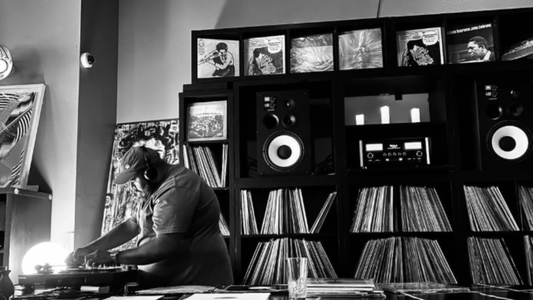
Parliament – Mothership Connection (1975)
George Clinton’s orbiting masterpiece and the joy of transcendence through groove.
By Rafi Mercer
Some albums don’t just arrive — they land. Parliament’s Mothership Connection didn’t roll out quietly onto the racks in 1975; it descended from orbit, lights flashing, horns blazing, basslines thick enough to shake the moon. George Clinton didn’t make a funk record. He created an entire cosmology — one where rhythm was freedom, the groove was gospel, and the dancefloor was a kind of cosmic church.
I’ve listened to it more times than I can count, and it still feels like discovery each play. Maybe it’s because every track is a universe of its own, but connected by that one impossible idea — that funk could be myth. The horns sound like spacecraft engines, the vocals like sermon and satire at once, and the lyrics… well, the lyrics are pure theatre. Clinton didn’t write songs so much as scenes — interplanetary manifestos about joy, liberation, and the right to groove.

“Star Child (Mothership Connection)” opens with that immortal transmission: “Citizens of the universe, recording angels…” — and suddenly you’re not on Earth anymore. The bassline rolls like a parade through deep space, Bootsy Collins grinning behind every note, and the horns (arranged by Fred Wesley and Maceo Parker) slice through like they’ve come straight from James Brown’s shipyard. But this isn’t soul on salary; it’s funk as freedom.
Through a good system — especially something with real warmth and weight — the album is alive in three dimensions. The low end is elastic, the snares tight, the layers of voices constantly in orbit around each other. “P-Funk (Wants to Get Funked Up)” builds like ritual: slow, spoken, cool as prophecy. Clinton’s preacher-voice narrates an entire philosophy of vibration — one that starts with the body and ends somewhere near salvation.
What astonishes me still are the lyrics — funny, absurd, profound. Lines like “Put a glide in your stride, and a dip in your hip” are more than catchphrases; they’re instructions for how to exist with style in a world that wants to dull your shine. Beneath the humour is resistance — the idea that dancing, laughing, and claiming joy could be political acts. Mothership Connection wasn’t escapism; it was transcendence disguised as funk.
“Give Up the Funk (Tear the Roof Off the Sucker)” is pure collective release — a groove so heavy it could power a small city. Every horn stab, every shout, feels like exorcism. Then comes “Handcuffs,” sly and subversive, and “Unfunky UFO,” a satire that’s also a celebration of belonging. Clinton was always flipping expectations — where others saw the future as technology, he saw it as freedom.
The brilliance of the album lies in how it connects cosmic imagination to earthly groove. In 1975, black artists claiming outer space wasn’t just creative whimsy — it was defiance. It said: we exist everywhere, we define the future too. Afrofuturism wasn’t a genre yet; Mothership Connection made it one.
Every time I put the record on, I’m reminded how physical it is. You don’t just listen; you inhabit it. The bass moves through you, the voices orbit your mind, the laughter catches you off guard. Clinton understood the geometry of funk — how rhythm could bend time, how repetition could become revelation.
And yet, despite all its bravado, there’s tenderness here too. A deep love of community, of the band itself, of the audience it invites to step aboard. The “Mothership” wasn’t just a gimmick — it was a metaphor for collective flight. Everybody was welcome, as long as they brought the funk.
Half a century later, it still sounds fearless. The record pre-empted hip-hop sampling (Public Enemy, Dre, Kendrick), electronic layering, even the live-mix aesthetic that modern producers still chase. But nothing has quite captured its warmth — that strange, human mix of absurdity and sincerity.
“You hear that? That’s the sound of the funk, from way out there.”
Play it loud, or play it late, but play it whole. Albums like this don’t fade; they orbit. Mothership Connection is a reminder that joy itself can be architecture — that laughter, bass, and imagination can build worlds.
Rafi Mercer writes about the spaces where music matters.
For more stories from Tracks & Tales, subscribe, or click here to read more.














